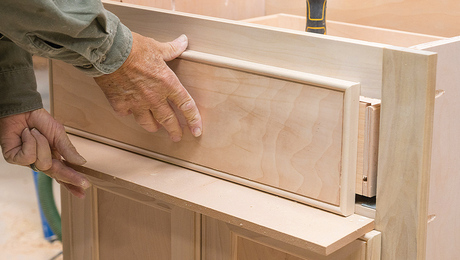*
There are a number of hairline cracks in the block foundation that was laid this summer. Will be putting a brick facade on in a few weeks. These cracks seem inevitable given the long runs of block, due to thermal expansion/contraction. Should I caulk these cracks before the brick goes on to keep water out (freezing is a concern)?
Discussion Forum
Discussion Forum
Up Next
Video Shorts
Featured Story

From building boxes and fitting face frames to installing doors and drawers, these techniques could be used for lots of cabinet projects.
Featured Video
Builder’s Advocate: An Interview With ViewrailHighlights
Fine Homebuilding Magazine
- Home Group
- Antique Trader
- Arts & Crafts Homes
- Bank Note Reporter
- Cabin Life
- Cuisine at Home
- Fine Gardening
- Fine Woodworking
- Green Building Advisor
- Garden Gate
- Horticulture
- Keep Craft Alive
- Log Home Living
- Military Trader/Vehicles
- Numismatic News
- Numismaster
- Old Cars Weekly
- Old House Journal
- Period Homes
- Popular Woodworking
- Script
- ShopNotes
- Sports Collectors Digest
- Threads
- Timber Home Living
- Traditional Building
- Woodsmith
- World Coin News
- Writer's Digest


















Replies
*
Crustacean,,are the cracks in the joints or across the blocks?
Was the wall properly reinvorced with good ol' re-bar?
I don't think CMUs are subject to
expansion/contraction problems under normal conditions unless the blocks are fresh out of the plant and not cured. Anyhow bricks tend to expand and blocks if anything will tend to contract on bigger walls, assuming this is a residential you are talking about. If the crcks are just in the joints they are most likely from mortar drying too fast.Also are the joints tooled?
*
There are a number of hairline cracks in the block foundation that was laid this summer. Will be putting a brick facade on in a few weeks. These cracks seem inevitable given the long runs of block, due to thermal expansion/contraction. Should I caulk these cracks before the brick goes on to keep water out (freezing is a concern)?